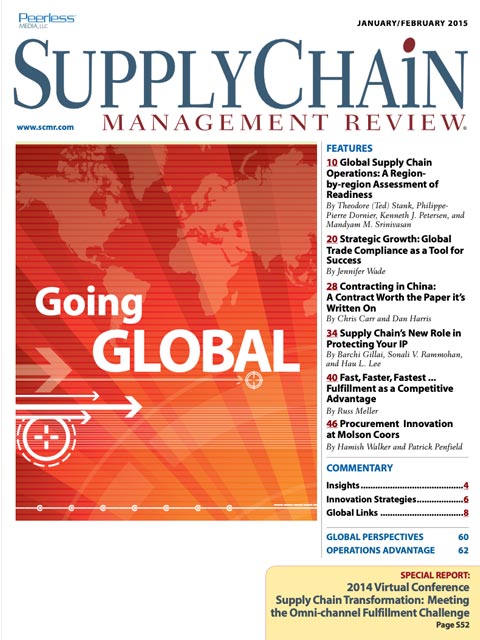Sorry, but your login has failed. Please recheck your login information and resubmit. If your subscription has expired, renew here.
January-February 2015
As long as there have been boats and beasts of burden, intrepid business professionals, governments, and marauders have sought fame, fortune, wealth, and value by going global. Think the Phoenicians, Marco Polo, and the Vikings in days of old. Or in contemporary times, think of China, BRIC, EMEA, and other emerging markets. One could argue that outsourcing to China a few decades ago gave birth to supply chain management as we think of it today. This month we’re including an online bonus column from APQC. While this issue focuses on global management, we didn’t want to miss out on the column. Browse this issue archive.Need Help? Contact customer service 847-559-7581 More options
Walk through the recently built UNICEF warehouse in Copenhagen, Denmark, and you will pass a room where office cubicles have been replaced with rolling tables, white boards, colorful couches, and a mix of gadgets and gizmos. This is the home of the organization’s Innovation Unit.
The fact that the unit is embedded in the supply chain function underlines the emphasis that UNICEF puts on developing innovative processes and grounding new product ideas with operational realities; a culture normally associated with leading companies.
This culture is central to the fight against the Ebola outbreak in West Africa. UNICEF is developing new ways to deliver the large volumes of supplies it ships, and is providing a critical conduit to support Ebola Treatment Units (ETUs) and Community Care Centers (CCCs). By October 8, 2014, more than 900 metric tons of supplies were delivered to the region in support of partners, through a total of 73 flights, according to UNICEF.
 |
This complete article is available to subscribers
only. Click on Log In Now at the top of this article for full access. Or, Start your PLUS+ subscription for instant access. |
SC
MR
Sorry, but your login has failed. Please recheck your login information and resubmit. If your subscription has expired, renew here.
January-February 2015
As long as there have been boats and beasts of burden, intrepid business professionals, governments, and marauders have sought fame, fortune, wealth, and value by going global. Think the Phoenicians, Marco Polo, and… Browse this issue archive. Access your online digital edition. Download a PDF file of the January-February 2015 issue. |
Download Article PDF |
Walk through the recently built UNICEF warehouse in Copenhagen, Denmark, and you will pass a room where office cubicles have been replaced with rolling tables, white boards, colorful couches, and a mix of gadgets and gizmos. This is the home of the organization’s Innovation Unit.
The fact that the unit is embedded in the supply chain function underlines the emphasis that UNICEF puts on developing innovative processes and grounding new product ideas with operational realities; a culture normally associated with leading companies.
This culture is central to the fight against the Ebola outbreak in West Africa. UNICEF is developing new ways to deliver the large volumes of supplies it ships, and is providing a critical conduit to support Ebola Treatment Units (ETUs) and Community Care Centers (CCCs). By October 8, 2014, more than 900 metric tons of supplies were delivered to the region in support of partners, through a total of 73 flights, according to UNICEF.
 |
SUBSCRIBERS: Click here to download PDF of the full article. |
SC
MR

Latest Supply Chain News
Latest Podcast

 Explore
Explore
Latest Supply Chain News
- AdventHealth named top healthcare supply chain by Gartner
- Geopolitical readiness in supply chains: Strategic challenges for leaders
- Unlocking retention: The role employee engagement plays
- Can supply chain managers embrace an entrepreneurial mindset?
- Challenges to ESG reporting
- With capacity to spare, logistics real estate demand remains subdued
- More latest news
Latest Resources

Subscribe

Supply Chain Management Review delivers the best industry content.

Editors’ Picks





